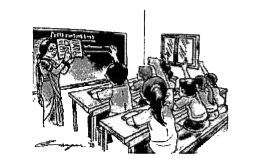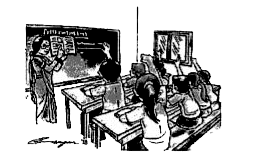The largest number in the sequence 1, 212, 313, 414,..., n1n is a. 212 b. 313 c. 515 d. 616
To find the largest number in the sequence 1,21/2,31/3,41/4,…,n1/n, we can analyze the values of k1/k for different integers k.
1. Understanding the Sequence:
The sequence consists of terms of the form k1/k where k is a positive integer. We need to find the maximum of these terms for k=1,2,3,…,n.
2. Calculate Initial Values:
Let's calculate the first few terms:
- For k=1: 11/1=1
- For k=2: 21/2=√2≈1.414
- For k=3: 31/3≈1.442
- For k=4: 41/4=√(4)4≈1.414
- For k=5: 51/5≈1.379
- For k=6: 61/6≈1.348
3. Finding the Maximum:
From the calculated values:
- 11/1=1
- 21/2≈1.414
- 31/3≈1.442
- 41/4≈1.414
- 51/5≈1.379
- 61/6≈1.348
The largest value among these is 31/3≈1.442.
4. Conclusion:
Therefore, the largest number in the sequence 1,21/2,31/3,41/4,… is 31/3.
Final Answer:
The correct option is b. 31/3.
The sequence consists of terms of the form k1/k where k is a positive integer. We need to find the maximum of these terms for k=1,2,3,…,n.
Let's calculate the first few terms:
- For k=1: 11/1=1
- For k=2: 21/2=√2≈1.414
- For k=3: 31/3≈1.442
- For k=4: 41/4=√(4)4≈1.414
- For k=5: 51/5≈1.379
- For k=6: 61/6≈1.348
From the calculated values:
- 11/1=1
- 21/2≈1.414
- 31/3≈1.442
- 41/4≈1.414
- 51/5≈1.379
- 61/6≈1.348
Therefore, the largest number in the sequence 1,21/2,31/3,41/4,… is 31/3.
The correct option is b. 31/3.
Similar Questions
Knowledge Check
The sum of the series 11.2+1.31⋅2⋅3⋅4+1⋅3⋅51⋅2⋅3⋅4⋅5⋅6+...is
Ae−1Be1/2−1Ce1/2+eDNone of these
The largest number that exactly divides each number of the sequence 15−1, 25−2, 35−3,.h5−n,.. is 1 (b) 15 (c) 30 (d) 120
View SolutionSum of n terms of the series 11.2.3.4.+12.3.4.5+13.4.5.6+....
View SolutionFor teaching the concept of probability, Mrs. Verma decided to use two dice. Shet took a pair of die and write all the possible outcomes on the blackboard. All possible outcomes wave:

(1,1), (1,2), (1,3), (1,4), (1,5), (1,6)
(2,1), (2,2), (2,3), (2,4), (2,5), (2,6)
(3,1), (3,2), (3,3), (3,4), (3,5), (3,6)
(4,1), (4,2), (4,3), (4,4), (4,5), (4,6)
(5,1), (5,2), (5,3), (5,4), (5,5), (5,6)
(6,1), (6,2), (6,3), (6,4), (6,5), (6,6)
The probabiliyt that both numbers comes up are prime numbers, is
View SolutionFor teaching the concept of probability, Mrs. Verma decided to use two dice. Shet took a pair of die and write all the possible outcomes on the blackboard. All possible outcomes wave:

(1,1), (1,2), (1,3), (1,4), (1,5), (1,6)
(2,1), (2,2), (2,3), (2,4), (2,5), (2,6)
(3,1), (3,2), (3,3), (3,4), (3,5), (3,6)
(4,1), (4,2), (4,3), (4,4), (4,5), (4,6)
(5,1), (5,2), (5,3), (5,4), (5,5), (5,6)
(6,1), (6,2), (6,3), (6,4), (6,5), (6,6)
The probability that both numbers comes up are even, is
View SolutionFor teaching the concept of probability, Mrs. Verma decided to use two dice. Shet took a pair of die and write all the possible outcomes on the blackboard. All possible outcomes wave:

(1,1), (1,2), (1,3), (1,4), (1,5), (1,6)
(2,1), (2,2), (2,3), (2,4), (2,5), (2,6)
(3,1), (3,2), (3,3), (3,4), (3,5), (3,6)
(4,1), (4,2), (4,3), (4,4), (4,5), (4,6)
(5,1), (5,2), (5,3), (5,4), (5,5), (5,6)
(6,1), (6,2), (6,3), (6,4), (6,5), (6,6)
The probability that 6 will come up on both dice is
View SolutionThe sum of n terms of the series 51.2.13+72.3.132+93.4.133+114.5.134+.. is (A) 1+12n−1.13n (B) 1+1n+1.13n (C) 1−1n+1.13n (D) 1+12n−1.13n
View Solution11.2+1.31.2.3.4+1.3.51.2.3.4.5.6+.....∞
View Solution
